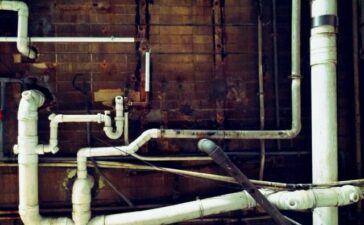The unfortunate nature of a gas leak is that you don’t know when it’s coming – until it’s too late. Fortunately, with the right skills and knowledge, you and your loved ones can avoid the devastating consequences of a gas leak in your home.
How We Use Gas in Our Homes
From the early 19th century, we have powered our homes with the wonder of natural gas. However, we’ve learned a lot since then and taken many precautions to ensure we can use natural gas safely in everyday processes, such as cooking, cooling our homes via an air conditioner unit, heating water for our showers and cleaning, and generating electric power. For many homes across the United States, gas is critical to several modern conveniences.
While many of us use gas in our homes, that also puts us at risk of a gas leak. When you have a gas leak in your home, it is a quick way to get sick from the potentially deadly effects of carbon monoxide poisoning. These symptoms include:
- Ringing in Ears
- Headaches, Dizziness, Fatigue, or Drowsiness
- Unusually Pale Skin
- Nausea and Reduced Appetite
- Chest Pains and Difficulty Breathing
- Nosebleeds
- Malaise (i.e., a General Feeling of Unwellness)
A few of these signs may be vague by themselves and in pairs; experiencing half or more of them at once may set off alarm bells. From general malaise to the development of vision or mood problems, no single symptom of carbon monoxide poisoning should be ignored.
Causes of Residential Gas Leaks
Upon understanding that gas leaks can be dangerous for our homes and our health, it is essential to learn more about the causes of residential gas leaks. In doing so, we can keep our eyes and ears open to the many signs that indicate our home could have a gas leak. There are several common causes of residential gas leaks. Some are preventable, while others are inevitable.
Here are four of the most commonly seen gas leak causes.
Pipes Need Resealed
As a cause that cannot necessarily be prevented, the seals on your gas pipe wear away with time and use. The easy solution to this type of gas leak is that the pipe simply needs to be removed so it can be resealed with specialized putty.
Faulty Installation
If the gas lines in your home aren’t installed correctly, you may see a gas leak that you cannot prevent. When this is the case, you need a professional immediately because part, if not all, of your piping needs to be redone.
Misuse of Appliances
If you have gas appliances, only use them as directed. Do not attempt to heat your home with the burners on a gas stove. Even more, a gas explosion could occur in that situation – and that’s disastrous, to say the very least.
Damaged Pipes
Pipes often become damaged for a range of reasons, including age, extreme weather, physical damage, and even ground or soil movement. Unfortunately, any cracks, chips, or holes can cause a gas leak within seconds.
Whether preventable or inevitable, the causes of residential gas leaks can happen at any time. That is why you and your family, loved ones, and those you live with need to be aware of the critical signs that you have a gas leak.
Common Signs You Need Gas Line Repair
After learning of the common causes of a residential gas leak, learning the signs is the next step. You must avoid the unhealthy effects of a gas leak and the potentially disastrous outcomes for your home and loved ones.
Here are the most common signs that you may need gas line repair.
Odd Sounds
Because you may not be able to smell a gas leak, keep an ear out in case you hear a gas leak occurring. More specifically, gas leaks can cause inexplicable hissing or whistling sounds. Typically, these sounds indicate a gas leak from your furnace or other home appliance. You must always pay attention to the noises made by your HVAC appliances in the case of something as dangerous as a gas leak.
Rotten Egg Smells
If you smell a sulfur smell in your home, call a local HVAC professional – and 911 – immediately because you have a gas leak. Natural gas has come a long way from the 19th century and is now made with additives that give off a sulfur smell to alert you of a gas leak – so take it seriously.
Dead Houseplants
If you don’t have a green thumb, a dead houseplant won’t serve as a sign of a gas leak. However, if you are good with plants and suddenly yours are dying or decaying, you have a gas leak. Listen to your home’s plants – it could save your life.
The Pilot Light is Yellow
Your furnace should always have a blue light. However, an orange or yellow flame is an indicator that you have a gas leak. The color change of the flame means that your unit is producing carbon monoxide gas.
Higher than Usual Gas Bills
As with any type of leak, the “overproduction” causes higher than unusual gas costs. If you notice higher-than-usual gas usage on your utility bill, you need to call in a professional to figure out whether that can be attributed to a gas leak.
When to Call a Professional
The short and long answer is always to call a professional if you suspect that you have a gas leak in your home. Never attempt to fix an unsealed pipe or simply relight an orange pilot light. Turn to family, friends, or reliable HVAC or plumbing professionals, such as MVP Plumbing, who will get you the help you need immediately.
Don’t hesitate to call an expert if you suspect that you have a gas leak.







